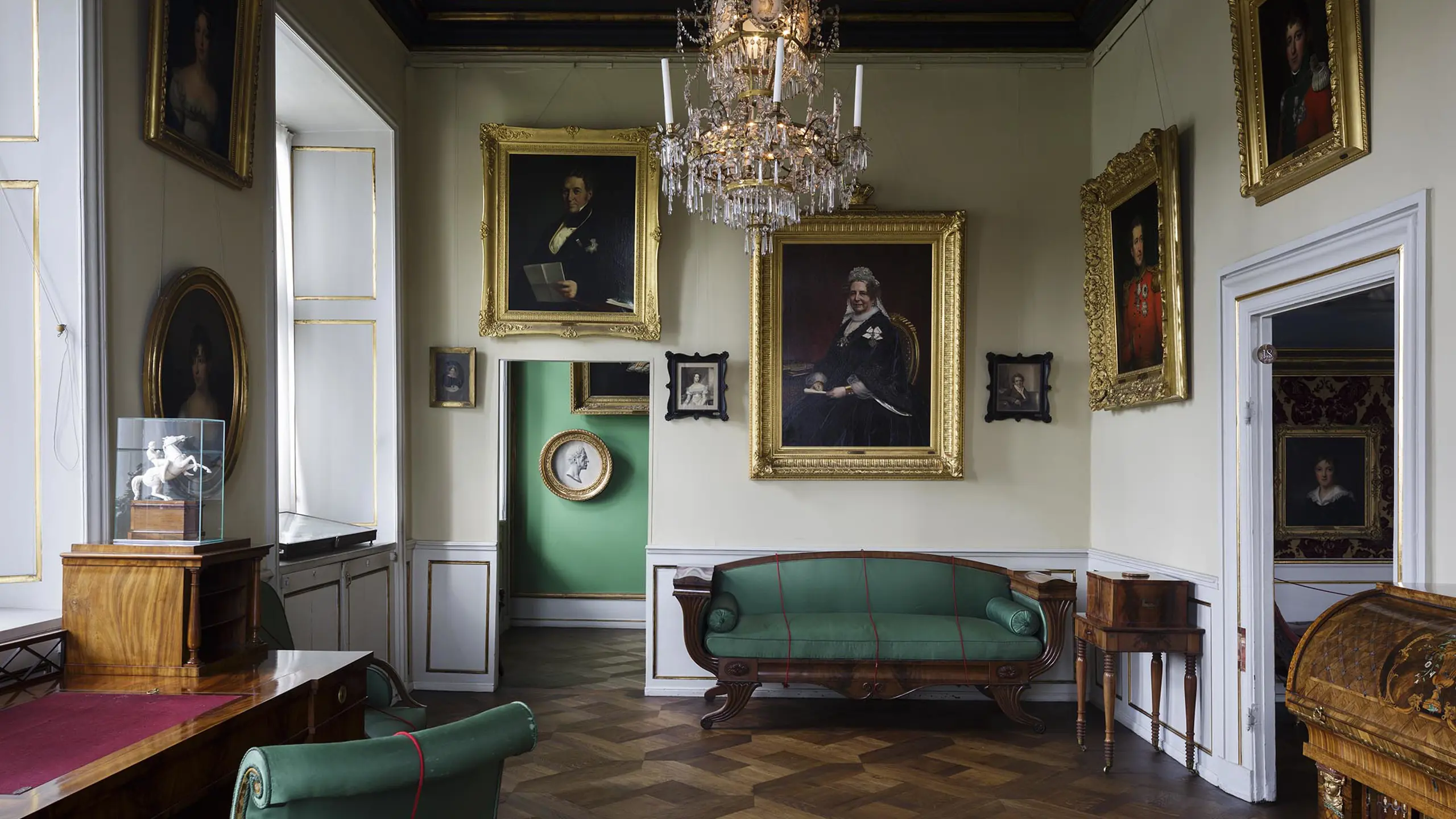Christian VIII’s Room (room 17)
Here you can see objects and paintings from the life of Christian VIII and the final years of the absolute monarchy

Christian VIII and Biedermeier classicism
The history and decoration of the room
Like the adjacent Frederik VII’s Room, this room was renovated during the early 18th century. This was when the room was given its current form, except for the ceiling, which has been preserved from the time of Christian IV.
When Rosenborg was turned into a museum during the mid-19th century, for the sake of chronology, it was decided to decorate this room with pictures and objects from the reign of Christian VIII (1786–1848).
Many of the items in this room date from Christian VIII’s youth, which was shaped, in part, by his brief reign as King of Norway in 1814.
Danish Golden Age exemplified by a mantel clock
Danish art and literature enjoyed a Golden Age during the first half of the 19th century. During this time, one significant trend was the so-called Biedermeier style, which revolved around everyday family life and simple comforts. One good example of this style is this mantel clock with a bronze figurine of Christian VIII, which shows the King relaxing in a chair, a clear contrast to the very formal royal portraits.
previous room <- | -> next room
Objects in the room
If you are at the museum, you can admire the fascinating objects in the room and read more about them below.
The descriptions are brief and generally do not include images. They are intended as an added resource if you would like more detailed information about an item, such as who made it, its origin and its meaning.
-
1700Christian VIII; painted by W.N. Marstrand 1843.
-
1701Charlotte Frederikke. Christian VIII's first wife and Frederik VII's mother. By unknown artist.
-
1702Queen Caroline Amalie, painted by H.Chr. Jensen 1879.
-
1703Christian VIII. Drawing by Mlle Romili.
-
1704Queen Caroline Amalie. Drawing by Mlle Romili.
-
1705Sofa with mahogany carving. Made for Christiansborg Palace, c. 1840.
-
1707Cabinet for Christian Horneman’s collection of miniatures which Christian VIII bought from the artist.
-
1708Christian VIII. Half-length, from c. 1812. Painted by C.G.Kratzenstein-Stub?
-
1711
-
1712
-
1713
-
1714
-
1715
-
1716
-
1717
-
1718
-
1720Mantelpiece clock with bronze statuette of Christian VIII. Signed: A. & W. Jacobsen.
-
1721Christian VIII. Watercolour by C.E. Sonne, after coronation picture by Eckersberg.
-
1722Queen Caroline Amalie. Drawing from the anointing of the Queen; by I.V. Gertner.
-
1723The coronation procession of Christian VIII across the courtyard of Frederiksborg Castle, 28th June 1840, painted by I.V. Gertner.
-
1724Christian VIII. Marble bust, made by F.C. Stramboe.
-
1725Heiress Presumptive Caroline as young, painted by F.C. Grøger.
-
1726Heiress Presumptive Caroline’s study at Bernstorff’s Palace. Coloured drawing, signed by Andreas Juuel from 1850s.
-
1727Christian VIII at his desk in his study at Amalienborg. Drawing signed: Chr. Hetsch 1881.
-
1728Mahogany writing table with gilded bronze fittings from Christian VIII's study at Amalienborg (See no. 1727).
-
1729Christian VIII. Equestrian statuette of silver, made by Adelgunde Herbst.
-
1730Silver jewel box, French work; presented to Queen Caroline Amalie by Mr. Donner, titular Councillor, Altona.
-
1731Horseman. Ivory figurine from Christian VIII’s private collection.
-
1732Queen Caroline Amalie, painted by F.C. Grøger.
-
1733Princess Charlotte, Frederik VII's mother; painted by F.C. Grøger.
-
1734Two mahogany armchairs with gilded carving. Belonged to Landgrave Vilhelm of Hesse, North Germany, c. 1820.
-
1735Necklace of gold with blue enamel. On the clasp, Princess Charlotte Frederikke's monogram.
-
1738Gold seal with cornelian plate; in the coat-of-arms the Norwegian Lion is seen in the top field. Used by Christian VIII as King of Norway 1814.
-
1739Three seals used by Christian VIII.
-
1740Clock with enamel, made in Hanau and presented, in 1794, to the eight year old Christian (VIII).
-
1741Child's spoon of silver gilt and silver tablespoon (master: A. Michelsen); used by Christian VIII for medicine, shortly before his death.
-
1742A Norwegian bank note, Christiania 1814.
-
1743Norwegian chamberlain's keys from 1814.